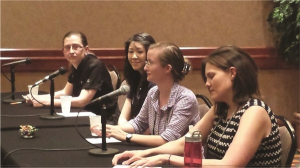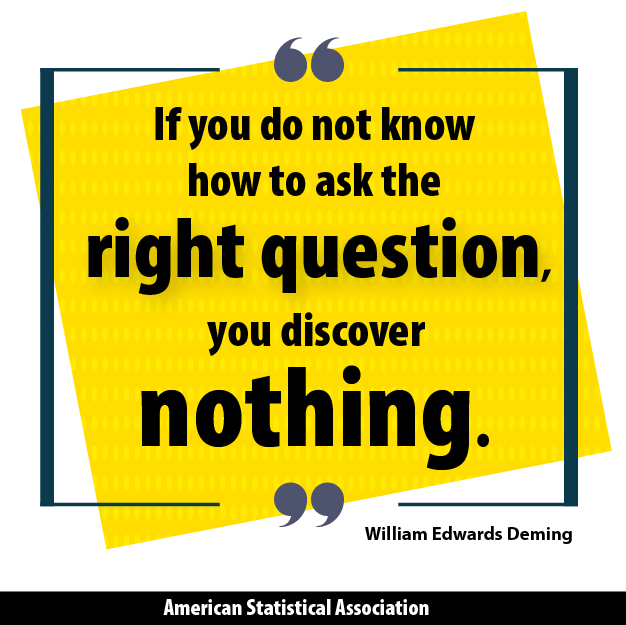The ASA will host a second round of Celebrating Women in Statistics and Data Science October 20–22, in Charlotte, North Carolina. The conference targets participants in career stages from undergraduate students through senior leader in academia, industry, and government.
The second conference will carry the same theme as the first, “Know Your Power.” Central to the conference is women sharing transformative moments in their lives, explaining how those moments affected their careers, and demonstrating how these individual moments lead to improvements in the stature of women in the field.
The conference will include two short courses, one on communication and the other on reproducibility in data science. There will also be a workshop, “Empowering Women with Self-Defense Skills Using R.” Panels on leadership, mentoring, career navigation, and choosing research topics will abound. And there will be research talks covering topological data analysis, fusion learning, ‘omics data analysis, machine learning, crowdsourcing, Big Data analytics, and graphical computation, to name just a few. Keynote speakers include Bin Yu, Stacy Lindborg, Wendy Martinez, and Cynthia Clark.
Questions about the conference may be sent to meetings@amstat.org. Register early! Participation is limited to the first 500 registrants.
Kimberly F. Sellers, K. Nicole Meyer, Maria A. Terres, Samantha Tyner, and Kaitlin Woo
This article ran in Volume 27 of CHANCE magazine about a session that took place during the Women in Statistics Conference in 2014.
With nearly 100 students attending the 2014 conference, there was no better way to kick off Celebrating Women in Statistics than with a panel titled “Surviving Graduate School.” Panelists K. Nicole Meyer, Kaitlin Woo, Maria Terres, and Samantha Tyner shared their experiences and insights with audience members. Kimberly Sellers, a Georgetown University faculty member, moderated.
The success of this panel would be determined by how comfortable the panelists and audience were discussing frustrations, anxieties, and personal situations. To ensure an open and frank discussion, Sellers started the session stressing, “What happens in the session stays in the session.”
With this assurance, audience members in various stages of graduate study discussed with the panelists a broad range of topics, including deciding between master’s and PhD programs, how to work through frustrations in one’s chosen program, selecting a research adviser, and developing a dissertation—start to finish.
Discussion flowed freely, often drifting into more sensitive questions and topics. Panelists and audience members offered insight to those in need of proactive approaches to deal with difficult situations. Not only did the session provide mental and emotional release for attendees, but also talking with other female students allowed everyone to recognize commonality in their experiences across institutions, giving credence to the notion of strength in numbers.
Diverse discussion topics offered opportunities for reflection and advice from the panelists about life lessons and making graduate school a rewarding experience, such as the following:
Have a life outside of graduate school
Graduate school can easily consume one’s life in a way that evolves into feeling overwhelmed, alone, and burned out. Panelists suggested putting boundaries on graduate school—allowing time to enjoy hobbies, family, and friends outside of the graduate program.
Stay true to yourself
Going to graduate school and staying there is a personal decision, but opinions and judgments from others spew forth regularly. Take time to understand the commitment this process requires and don’t be afraid to evaluate and possibly change your environment, if necessary. As you prepare to complete your graduate training, faculty and students alike will offer opinions about what you should do as a career. Understand that these opinions, while perhaps genuine, will contain personal bias. It is important to seek the advice of people outside your institution and outside academia who can offer you broader perspectives on career options. The ultimate decision remains yours. Listen carefully, but accept cautiously the advice of others. Keep their opinions in context and try not to become overly swayed by them.
Get your master’s degree en route to the PhD
More and more students are entering directly into PhD programs from a baccalaureate degree, and these graduate programs offer a (usually rather simple) means to obtain the master’s degree upon completion of the qualifying examinations. It is a good idea to complete this requirement so you have the degree to your credit. Sometimes, life events can derail, postpone, or slow down graduate school pursuits. Having the master’s degree under your belt offers added security.

Panelists K. Nicole Meyer (University of South Alabama), Kaitlin Woo (Memorial Sloan Kettering Cancer Center), Maria Terres (Duke University), and Samantha Tyner (Iowa State University) share their graduate school experiences with the audience.
Establish a support network
Create a network that supports you intellectually and emotionally, such as older/past students, advisers, and other faculty advocates. Remember, if you are struggling in some way, then others probably are too, and it will help to talk about it in a safe space with those you trust. It is useful to learn from older students who have gone through the same hurdles in the program. Knowing others experienced the same concerns/anxieties and were successful can boost your own perseverance and confidence. Older students are particularly helpful with sharing course and qualifying exam materials to supplement your studies and in offering feedback on various departmental matters concerning students and the graduate school process particular to your department. Having a support network that extends outside of your department can also help you remember to have a life outside of graduate school.
Find an adviser with a compatible personality and working style
For some panelists, this was of utmost importance. A conflict-ridden student-adviser relationship can make the research process lengthy and painful and the dissertation completion and graduation feel elusive. Panelists advised due diligence in familiarizing one’s self with faculty research interests and papers before meeting with them to discuss advising relationships.
Be prepared for anything
Unfortunately, female students continue to experience sexism in their graduate programs and the broader academic environment. While sometimes subtle, audience and panel members agreed that these experiences are nonetheless disturbing and painful. Revealed events included professors over-explaining or dumbing down concepts to female students and fellow male students ignoring suggestions made by their female counterparts but listening when the same suggestion is made later by a male student. Just as frustrating to students was reporting their concerns to peers or faculty, only to have them brushed off with excusatory responses such as, “Don’t worry about it, it’s just a cultural difference.”
Overcome dissertation intimidation
A good deal of discussion focused on transitioning from coursework to research, including how to determine one’s research interests and getting started in research. The idea of writing a dissertation was abstract to many audience members, leaving them unsure of how to proceed. Panelists encouraged students to break down the process into several steps, rather than consuming themselves with the idea of the finished product. One first-step suggestion was to read and summarize previous and related thus gaining context surrounding the dissertation research idea. This includes trying to determine any drawbacks associated with these methods or works as they may help to motivate your research idea. The summaries will prove helpful later in formulating the literature review for the dissertation. Another suggestion was to create an agenda of daily, weekly, and monthly tasks to stay organized and to keep progress going daily. This proves helpful not only in your progress, but also in preparing for meetings with your research adviser and providing an agenda for research meetings.
Use social media
Some panelists encouraged using Twitter as a tool to learn about current research and to stay connected with people met at conferences or related events. Further, an active presence on Twitter can be used to complement the usual sources for internship and job announcements, such as word of mouth and university job boards. There is an active statistics community on Twitter with many opportunities to learn from others in the field. LinkedIn is also a great resource for networking and the job search. Employers and recruiters, particularly in industry, are present on LinkedIn and may contact you if they see your profile and consider you a desirable candidate. The site is also a good tool for exploring different companies and job opportunities, even when you are not actively searching.
The graduate student panel succeeded in creating an environment for honest and open discussion about female graduate student experiences. Actively addressing concerns made the audience feel more empowered and energized as they returned to their respective institutions. Suggestions for future panel discussions included how to address sexism without offending or alienating either the offender or oneself and how to navigate graduate school as an atypical student, such as students who are older, married, mothers, or caregivers to elderly relatives.
The diverse panel demonstrated that female graduate students take many forms, yet all can be successful in their respective pursuits.
Author Bios
Nicole Meyer earned her bachelor’s and master’s degrees from Georgetown University and completed her doctoral work with Michelle Lacey at Tulane University in 2013. Her research interests are biostatistics, stochastic models for biological processes, and epidemiology. She is an assistant professor in the department of mathematics and statistics at South Alabama University.
Kimberly Sellers is an associate professor of mathematics and statistics. She held previous faculty positions at Carnegie Mellon University and the University of Pennsylvania. Her areas of interest and expertise are in generalized statistical methods involving count data that contain data dispersion and in image analysis techniques, particularly low-level analyses including preprocessing, normalization, feature detection, and alignment.
Maria A. Terres earned her PhD in statistical science at Duke University. She is a postdoctoral research scholar at North Carolina State University working with Montserrat Fuentes. Her research focuses on spatial-temporal modeling for environmental and ecological applications. As a graduate student at Duke, she was awarded the James B. Duke Fellowship and the 2014 Dean’s Award for Excellence in Teaching.
Samantha Tyner graduated from Augustana College in Illinois in 2012 with a BA in math, economics, and French. She is currently in the statistics PhD program at Iowa State University and works as a research assistant with Iowa State’s Institute for Transportation. Her research interests include statistical graphics and networks.
Kaitlin Woo graduated from Georgetown University in 2011 with a BS in math and earned a master’s degree in biostatistics from the University of Pennsylvania in 2013. She is a research biostatistician at Memorial Sloan Kettering Cancer Center in New York City, where she analyzes data from phase I and II clinical trials and retrospective studies.




Leave a Reply